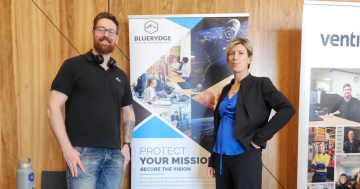Lisa Burden* says that as employers come to grips with a constant need to upgrade skills, the science of learning is entering mainstream training for workers.
 A red-hot talent market — combined with information that moves faster than ever before — means employees and employers are coming to grips with a constant need to upgrade skills and acquire new expertise, making on-the-job learning important for both workers and employers.
A red-hot talent market — combined with information that moves faster than ever before — means employees and employers are coming to grips with a constant need to upgrade skills and acquire new expertise, making on-the-job learning important for both workers and employers.
It is, perhaps, no surprise that the science of learning is starting to make its way into mainstream training for workers.
Behavioural theories affecting learning
There are a number of fields impacting employee learning, according to Paul Hanges, a professor of industrial/organisational psychology at the University of Maryland.
“There’s a lot of technical pieces that organisations should go through in order to increase the chance that the training program will deliver on what the organisation needs and [provide the] skills that the employees actually need to do the job,” he says.
Psychology plays an extensive role in employee training and overall diversity management strategies, according to Kimberly Underwood, University of Phoenix Research Chair.
When new employees initially encounter organisational cultures, they enter with their individual identities, beliefs, values, biases and experiences, she said.
Effective organisational diversity socialisation largely depends on the extent to which employees believe their identity is accepted within the organisational culture and how this is tied to the mission and values of the organisation.
Underwood said this can lead to either a successful socialisation process or dysfunctional behaviour such as biased decision-making, incivility or an inability to assimilate within teams.
A culture of learning is a ‘must’
Why is it important to understand this?
Because, experts say, a learning culture is a must.
A learning culture is more important than ever before, according to BetterUP’s CIO, Gabriella Kellerman.
“Market forces are shifting so constantly, and technologies emerging so rapidly, that a learning culture is not just a nice-to-have, it’s a necessity for survival,” she said.
Constant technological and market changes mean that so-called hard skills expire just as soon as they are mastered, she said, which means workers need to expect continuous learning and relearning as part of their role.
But that doesn’t mean soft skills — leadership, innovation, agility — are being neglected.
An increasing number of employers are also turning to training in those areas to help support a workforce navigating the new reality of constant change, Kellerman said.
The result can be improved engagement and retention.
Data shows that people will stay on the job longer because of training, said Kurt Kraiger, a professor of industrial organisational psychology and the founder of jobzology.com.
It’s a powerful retention tool, he said.
Real-world applications
It remains a challenge for employers to link specific learning programs to the key outcome metrics of productivity and retention.
Overall there’s an enormous and growing gap between common practices and state of the art evidence-based approaches, Kellerman said.
There are sound training principles that well-run learning organisations keep coming back to, Kraiger said.
For example, employers need a plan so that the training is designed around things that actually matter.
It’s also crucial to listen to employees, he added.
If you can say “this training program is going to give you something that you can immediately take back to your job,” you’ll be in a good position.
The more relevant the training appears to adults, the more motivated they are to learn, he said.
Learning programs designed around the latest behavioural science findings focus on a number of key principles, the experts said:
Create deep learning:
Kellerman said it must be deeply integrated across multiple cognitive domains, so one doesn’t simply memorise facts but instead can productively use the training in context at work in multiple different arenas.
Target learners who are ready:
According to Kellerman, not all employees are ready to learn and to change.
And when they are ready, the kind of change they can achieve will vary.
Optimal learning programs select for learner readiness based on pre-learning assessments that help identify not just who is ready to learn, but what types of goals they are most motivated to work toward.
Give support:
Feedback and accountability are some of the most important kinds of support learners need to successfully achieve their goals, Kellerman said.
Coaches are great accountability partners because of the connection and trust in that relationship, which allows learners to feel safe making mistakes.
Measure the learning:
Learners themselves, as well as their broader organisations, need to be able to track progress effectively to know what’s working and what’s not, Kellerman said.
Self-assessments are a simple way to start, and these should be designed to measure lasting behavioural change rather than incremental knowledge retention.
Avoid multi-tasking:
Hanges noted the importance of the amount of memory that can be devoted to a particular task.
What we know, he said, is that, as attention span is split over multiple tasks, the amount of attention that can be devoted to a particular task such as learning decreases; and so, training is less effective, he said.
Demonstrate relevance:
Primary and high school students are told what to do, but that doesn’t work for adults, Hanges said.
Adults need to be active learners and it’s important that the relevance of the training materials be demonstrated.
Allow learners to teach:
Adults have experiences that can enrich everyone, so you have to allow for discussion and for people to bring in their experiences from the workplace to enrich the material, Hanges said.
Create time to apply the training:
Workplaces need to allow employees to apply what they have learned, Hanges said.
If employees return from training and a boss tells them to forget what they learned, or that the workload doesn’t permit time for experimentation, “then the training doesn’t really matter,” Kraiger said.
* Lisa Burden is a freelance legal and business writer.
This article first appeared at www.hrdive.com.











